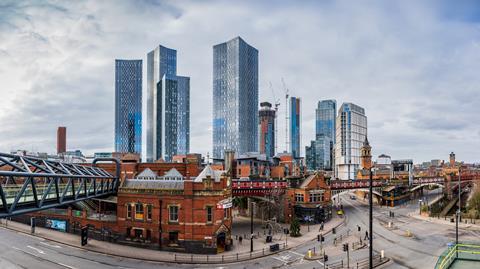Second cities must grow significantly to break UK out of cycle of low productivity, says report

A new report published this week argues that growing Britain’s second cities will be key to breaking the UK economy out of a cycle of low growth and falling real wages.
Titled Ending Stagnation – A New Economic Strategy for Britain, and published by The Economy 2030 Inquiry, a collaboration between the Resolution Foundation and the Centre for Economic Performance at the LSE, the report argues that Britain has experienced 15 years of relative decline, marked by stagnant productivity growth and flatlining wages.
It claims the UK’s productivity gap with France, Germany and the US has doubled since 2008, contributing to £3,400 of lost output per person annually. On average, according to the report, this means that British workers are £10,700 per year less well off, and that nine million younger workers have never experienced sustained average wage rises.
The combination of slow growth and high inequality, the report asserts, has widened the living standards gap, leaving poor households in Britain around 27 percent worse off than their counterparts in France and Germany.
The report criticises existing strategies for economic revitalisation, dismissing notions that boosterism automatically translates into actual achievements or that transforming Britain into a manufacturing powerhouse akin to Germany is feasible.
To combat the UK’s challenges, the report advocates for a strategy centred on leveraging Britain’s strengths as a services economy, prioritising investment, and fostering growth in cities beyond London.
Key proposals include:
- Building on Britain’s status as a leading services exporter by recognising the rapid growth in global trade for services and protecting high-value manufacturing in European supply chains.
- Investing significantly in public transport networks and housing in major cities like Birmingham and Greater Manchester to attract advanced firms and skilled workers.
- Increasing public investment to three per cent of GDP and ensuring sustained long-term investment alongside the transition to net zero emissions.
- Allowing competitive pressure to facilitate the growth of successful businesses while empowering workers to take risks and enhancing unemployment insurance.
Highlighting the importance of city connurbations in successful global economies, the report compares the size and growth of the UK’s second cities unfavourably to their internaional peers. It also asserts that all England’s biggest cities outside London have productivity levels below the national average.
The report states: “At the heart of this problem are the UK’s twin second cities: Greater Manchester and Birmingham. With populations of around 2.8 million each, their size means they must be centre stage not just for the sake of their own prosperity, but also for the sake of Britain’s. They are too big to fail.”

The report suggests that bridging the productivity gaps between these cities and London should be a national priority, but that achieving this would necessitate substantial changes: a 15 to 20 per cent increase in each city’s business capital stock; an influx of over 160,000 additional highly skilled workers in both cities; expansion of city centres either upwards or outwards, and substantial investment from central government to enhance transport networks.
> Also read: What does the HS2 decision mean for Manchester and the North-west?
The report claims that enabling more regions to participate actively in the UK economy would bolster national growth and reduce both regional productivity disparities and national inequality.
While seeing the transition to net zero as essential to addressing the climate crisis, the report does not see a new green economy as a major source of growth. Instead it argues that the UK will need to redistribute existing resources. It suggests insulating homes should be a priority, but highlights the challenges around homeowners paying for such work, partparticularly the less well off. The UK should draw inspiration from president Biden’s Inflation Reduction Act, it argues, as an example of the level of state intervention required to achieve a successful transition.
One caveat it highlights is that while the move towards greater prosperity for connurbations like Greater Manchester might reduce poverty overall, it could also exacerbate within-region inequality by fostering an environment with more high earners.
Hence, the report underscores the importance of expanding housebuilding efforts to facilitate thriving cities while steering clear of replicating London’s model, where low-income earners are seen as facing exorbitant housing costs.
The report acknowledges that apprehension among residents regarding heightened local inequality and the disruptions associated with pursuing growth is understandable. And it highlights that substantive progress towards achieving these goals would necessitate assertive and empowered local leadership capable of handling disruptions effectively, thereby strengthening the case for fiscal devolution.
The report also points to insufficient and erratic public sector investment as a major obstacle to growth and investment, ranking the UK as the second most erratic among advanced economies over the past six decades.
This unpredictability, the report argues, hampers long-term planning and exacerbates the difficulties in executing investment plans.
















1 Readers' comment